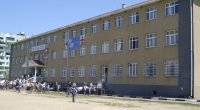The Turkish ambassador has urged Sheik Hasina’s government to “take action” against Turkish nationals living here, who he says are linked to a “terrorist group” involved in last year’s attempt to topple the regime of president Recep Tayyip Erdogan in Ankara.
Since the failed July 2016 coup, Turkey has been extracting its nationals from many countries around the world with the help of those governments, using various techniques.
Recently, many Turkish nationals in Bangladesh have been forced to leave the country after the validity of their passports expired.
A Turkish man, requesting anonymity, claimed that his embassy in Dhaka had “forcibly” confiscated his passport.
He said that many Turkish children who were born in Bangladesh have no documented nationality as the Turkish consulate office denies to issue passports for them.
In a recent press conference, Ambassador Devrim Öztürk claimed that some Turkish nationals in Dhaka, in particular those working at the Turkish Hope School, were involved with what he called the Gülenist Terror Organisation (FETÖ).
He also accused Turkish-Bangladesh Chamber of Commerce and Industry (TBCCI) of associating with this group. He urged Bangladeshi authorities to “take action” against these groups.
Foreign Ministry officials who spoke to the Dhaka Tribune said they saw the ambassador’s request as a violation of diplomatic norms.
The foreign secretary told the Dhaka Tribune that action has been taken against the Turkish Embassy for their conduct.
‘We don’t even think about politics’
Turks in Dhaka gather daily at several Turkish restaurants in the capital’s upmarket areas. Our correspondents reached out to them at one such venue.
A pregnant Turkish woman who came to the restaurant with her daughter, a student of class 2, said they are closely monitoring the government’s decisions.
“We do not know the actual scenario in Turkey, but we have seen the news,” she said.
The Turkish community in Dhaka was shocked after reading their ambassador’s statement in the media, she said.
“From our relatives and friends we came to know that Turkish nationals are facing problems. Their passports are confiscated, newborns in Turkish families are not given birth registration, simply our human rights are being violated around the world,” she said.
In a recent press conference, Ambassador Devrim Öztürk claimed that some Turkish nationals in Dhaka, in particular those working at the Turkish Hope School, were involved with what he called the Gülenist Terror Organisation (FETÖ). Foreign Ministry officials who spoke to the Dhaka Tribune said they saw the ambassador’s request as a violation of diplomatic norms. The foreign secretary told the Dhaka Tribune that action has been taken against the Turkish Embassy for their conduct.
The woman has been in Bangladesh for five years. She said she was worried about her upcoming baby’s birth registration as a Turkish national.
The owner of the Turkish restaurant- himself Turkish – said the government in Ankara is just blaming innocent Turkish nationals who are not even thinking about the country’s political situation.
“Our family members in Turkey said people from all walks of life – such as doctors, engineers, teachers, and government employees – are being arrested,” he said.
A website maintained by anonymous journalists, www.turkeypurge.com, has been keeping track of the crackdown in Turkey since the coup.
It says that up to July 31, a total of 145,711 Turkish nationals have been sacked from their jobs, 122,756 have been detained, and 56,987 have been arrested including 274 journalists.
In addition, 8,573 academics and 4,424 judges and prosecutors have been dismissed, while 2,099 educational institutions and 149 media outlets have been shut down.
The restaurant owner pointed to a photo montage on his wall, illustrating so many aspects of Turkish cultures.
“Now they are targeting the expatriates but we are here doing the business and also promoting our country’s culture,” he said.
“The Turkish government is just blaming its own citizens, which is unlawful. All these people who are being arrested, all of this is being done on the basis of suspicion. The government has no reason, no proof of the blame made on the innocent citizens.”
The businessman, who speaks fluent Bangla, has been living in Bangladesh for 13 years. He said he is not too worried since he is in Bangladesh.
“Bangladesh is a democratic country, But I would be worried if I were in Turkey,” he said. “I visited my mother in Turkey during last Ramadan but now I am worried whether I will be able to come back to my family in Bangladesh if I go again.”
He has two sons and a daughter, all of whom are living in Bangladesh and have Turkish passports.
He stressed that said if the Turkish government needs to arrest any expatriate, they need to show proof of involvement in the insurgency.
He also called on their ambassador to be very specific about on whom the government is trying to impose the FETÖ tag.
“Most of the Turkish people who are doing business here in Bangladesh don’t know what happened, how the insurgency happened in last year,” he said.
Foreign Ministry displeased
Over the last few years, Turkey’s position against the prosecution of war crimes committed during the 1971 War of Liberation in Bangladesh, including support for war criminals Ghulam Azam and Motiur Rahman Nizami, has strained ties between the two nations.
In May last year, when Nizami was hanged, Turkey withdrew its ambassador. Bangladesh nevertheless declared its support for its elected government during the failed coup in July, following which Ankara returned Öztürk to Dhaka in August.
The ambassador offered words of concession after his arrival, condemning the murder of the Father of the Nation in 1975 and expressing gratitude to Prime Minister Sheikh Hasina for her support during the coup.
But since the coup, the Islamist AK Party government has been pushing countries around the world to help it pinpoint Turkish nationals living abroad who it deems to be supporters of the exiled Turkish cleric and politician, Fethullah Gülen. The AK Party blames Gülen and his supporters, whom they call FETÖ, for the coup.
A Foreign Ministry official said the ambassador’s statement urging Bangladesh to “take action” against people was a gross violation of diplomatic norms.
“Personally, I did not like it,” a high-ranked official at the ministry, requesting anonymity, told the Dhaka Tribune on Wednesday.
The official expressed grave disappointment when asked about the stance on recent remarks made by Öztürk at a press briefing on July 15, on the occasion of the first anniversary of the thwarted coup attempt in Turkey.
The official said a foreign office consultation (FoC) between Bangladesh and Turkey was scheduled to be held on June 4, but the Turkish side, without prior notice, postponed the meeting at the eleventh hour.
The diplomat hoped that “the issue” would have been discussed in the FoC.
“The FoC will be rescheduled soon,” the official added.
Foreign Secretary Shahidul Islam said: “Since they have violated diplomatic norms, we have taken actions against them. But I do not want to say just now what action has been taken.”
Global campaign of fear
Turkish nationals in many countries around the world have reported facing denial of consular services, says the Netherlands-based Institute on Statelessness and Inclusion.
This includes the cancellation and confiscation of passports, or the refusal to extend their validity, and the refusal to provide nationality identity cards or passports to children born to Turkish citizens abroad.
It follows the publication in Turkey of decree no. 680, which provides for the withdrawing the citizenship of individuals who are suspected of crimes or rebellion against the government, or of membership of a terrorist organisation.
This followed the failed coup attempt against the regime of President Recep Tayyip Erdogan in July 2016, since when several Turkish nationals have been deported from Myanmar, Thailand and Malaysia, allegedly at the request of Turkey.
On May 24, 2017, Muhammet Furkan Sokmen, a former employee of an international school in Yangon, was reportedly arrested at Yangon International Airport in Myanmar over alleged links to exiled Turkish cleric and politician, Fethullah Gulen.
Muhammet was sent to Thailand, where he was held at an immigration detention center before being deported to Turkey on May 26.
In another incident on the same day, immigration police detained a Myanmar-based education professional Furkan Sökmen and his wife and their two-year-old daughter at Yangon airport while trying to board a flight to Bangkok.
US-based basketball player Enes Kanter, an outspoken critic of Erdogan, was briefly detained on May 20 at an airport in Romania upon a request from the Turkish government, but hours later he was released.
On another occasion in May, at least three Turkish nationals – a teacher, an academic, and a businessman – were abducted without warning in Malaysia and deported.
Separately, a Turkish teacher was detained in Georgia at the request of the Turkish government.
A recent report by the Sweden-based monitoring group Stockholm Center for Freedom (SCF) said that Turkish nationals perceived to be critical of the government are being denied consular services abroad.
Members of the Gulen movement, which the government accuses of masterminding the July 15 coup attempt, are targeted most in discriminatory service denials. Kurds, Alevis, and leftist groups abroad are also being made to suffer, according to SCF.
Instead of being able to renew their passports, many of the Turkish nationals abroad are offered a document to return to Turkey, where they are likely to be arrested.
‘No politics at Turkish Hope School’
The chairman of the management committee of International Turkish Hope School (ITHS) in Dhaka has told the Dhaka Tribune that the school is an educational institution only and is not involved in politics.
Bedrettin Suata described recent allegations by the Turkish ambassador to Bangladesh, Devrim Öztürk, that some staff members of the school are involved with a Turkish terrorist organisation as “their problem, not ours”.
“Our position is very clear: we are educators, we are not into politics,” the chairman said. “We are only dealing with education and culture. There are no harmful elements here.”
Suata explained that there are many ITHS schools with the same name all over the world, but there is no chain or inter-connectivity among them.
“We have no official connection with any of these schools. This is something like Chinese restaurants or Japanese martial art centres,” he said. “We have no idea about what was stated by the embassy against us. We are surprised.”
Suata said the school has full confidence that Bangladesh is capable enough to find out and decide what is right and what is wrong.
“We are following directions only from the Bangladeshi authority, because we are registered as a Bangladeshi educational institution,” he said. “We hope that the Bangladesh government will continue to act reasonably.”
However, the chairman said the school management had decided to change the name of the school in the shortest possible time because the inclusion of the word ‘Turkish’ is creating confusion.
International Turkish Hope School was established in Dhaka in 1996 as a project of Int’l Hope Company Ltd. The school in its six branches employs 396 people, including 33 Turkish and 210 local teachers.

























